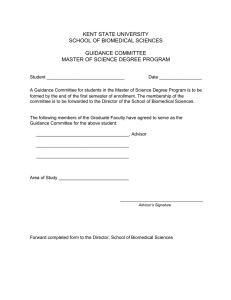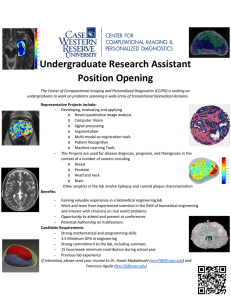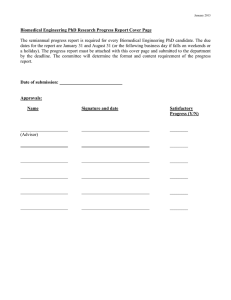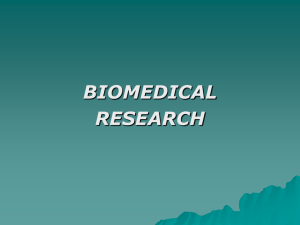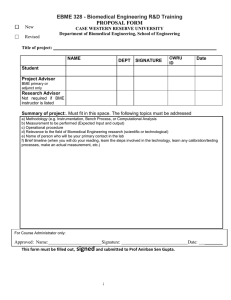Formal Course Syllabus - K
advertisement
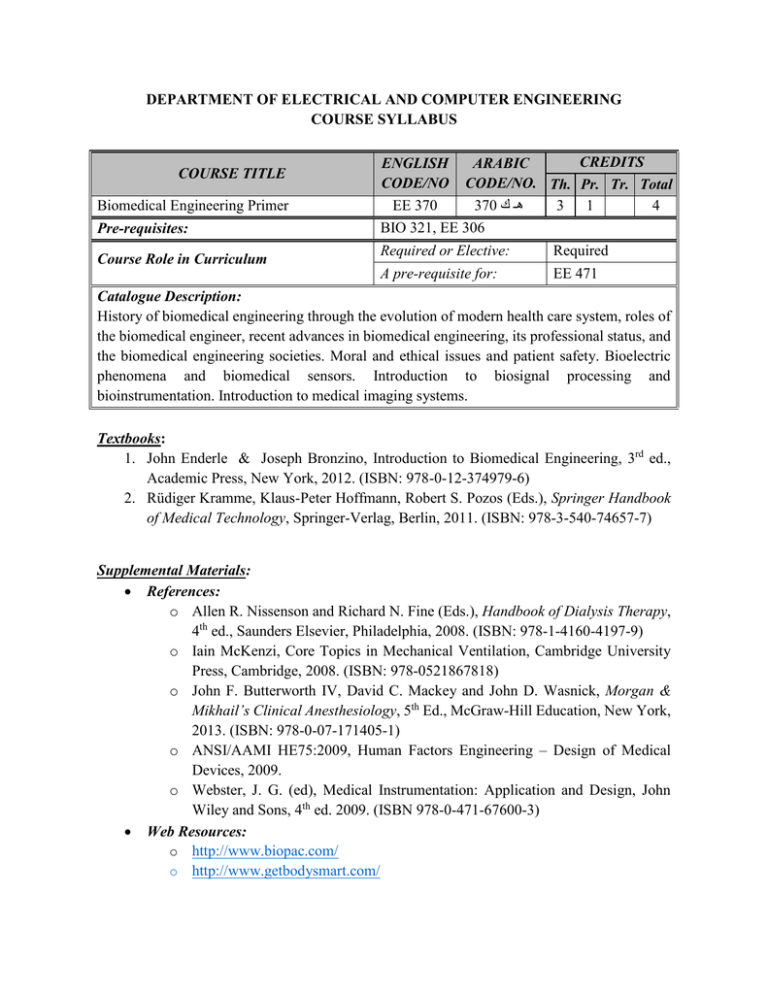
DEPARTMENT OF ELECTRICAL AND COMPUTER ENGINEERING COURSE SYLLABUS CREDITS ARABIC CODE/NO. Th. Pr. Tr. Total 370 هـ ك 3 1 4 Biomedical Engineering Primer ENGLISH CODE/NO EE 370 Pre-requisites: BIO 321, EE 306 COURSE TITLE Course Role in Curriculum Required or Elective: Required A pre-requisite for: EE 471 Catalogue Description: History of biomedical engineering through the evolution of modern health care system, roles of the biomedical engineer, recent advances in biomedical engineering, its professional status, and the biomedical engineering societies. Moral and ethical issues and patient safety. Bioelectric phenomena and biomedical sensors. Introduction to biosignal processing and bioinstrumentation. Introduction to medical imaging systems. Textbooks: 1. John Enderle & Joseph Bronzino, Introduction to Biomedical Engineering, 3rd ed., Academic Press, New York, 2012. (ISBN: 978-0-12-374979-6) 2. Rüdiger Kramme, Klaus-Peter Hoffmann, Robert S. Pozos (Eds.), Springer Handbook of Medical Technology, Springer-Verlag, Berlin, 2011. (ISBN: 978-3-540-74657-7) Supplemental Materials: References: o Allen R. Nissenson and Richard N. Fine (Eds.), Handbook of Dialysis Therapy, 4th ed., Saunders Elsevier, Philadelphia, 2008. (ISBN: 978-1-4160-4197-9) o Iain McKenzi, Core Topics in Mechanical Ventilation, Cambridge University Press, Cambridge, 2008. (ISBN: 978-0521867818) o John F. Butterworth IV, David C. Mackey and John D. Wasnick, Morgan & Mikhail’s Clinical Anesthesiology, 5th Ed., McGraw-Hill Education, New York, 2013. (ISBN: 978-0-07-171405-1) o ANSI/AAMI HE75:2009, Human Factors Engineering – Design of Medical Devices, 2009. o Webster, J. G. (ed), Medical Instrumentation: Application and Design, John Wiley and Sons, 4th ed. 2009. (ISBN 978-0-471-67600-3) Web Resources: o http://www.biopac.com/ o http://www.getbodysmart.com/ o Instructor’s course web site (additional handouts and lecture presentations) Course Learning Outcomes: By the completion of the course the student should be able to: 1. List the different fields of activities in which biomedical engineers may work to solve societal problems 2. Identify some of the professional societies and the professional status of biomedical engineering 3. Identify the modern moral dilemmas in professional ethics 4. Identify different types of potential hazards and how to proactively address patients safety in modern hospitals 5. Describe and learn how to utilize biomedical sensors 6. Describe the characteristics of biosignals and their basic methodologies 7. Describe the basics of medical instrumentation systems 8. Describe the basics of medical imaging systems Topics to be Covered: Duration in Weeks 1 1. History of biomedical engineering 2. Biomedical sensors 2 3. Biosignal processing 2 4. Bioinstrumentation 4 5. Medical Imaging Systems 4 6. Patient safety and professional ethics 1 Student Outcomes addressed by the course: (Put a sign) (a) an ability to apply knowledge of mathematics, science, and engineering (b) an ability to design and conduct experiments, as well as to analyze and interpret data (c) an ability to design a system, component, or process to meet desired needs within realistic constraints such as economic, environmental, social, political, ethical, health and safety, manufacturability, and sustainability (d) an ability to function on multidisciplinary teams (e) an ability to identify, formulate, and solve engineering problems (f) an understanding of professional and ethical responsibility (g) an ability to communicate effectively (h) the broad education necessary to understand the impact of engineering solutions in a global, economic, environmental, and societal context (i) a recognition of the need for, and an ability to engage in life-long learning (j) a knowledge of contemporary issues (m) an ability to use the techniques, skills, and modern engineering tools necessary for engineering practice. Key Student Outcomes assessed in the course: (a), (b), and (f) -----------------------------------------------------------------------------------------------------------Instructor or course coordinator: Yasser Mostafa Kadah Professor, BME Program. Email: ykadah@kau.edu.sa Office: Bldg#40, Rm24G05. Office hours: TBD. -----------------------------------------------------------------------------------------------------------Evaluation Criteria Class Homeworks 10% Lab Reports 20% Written Quizzes 20% Term Projects 20% Final Exam 30% Last updated: January, 2015
